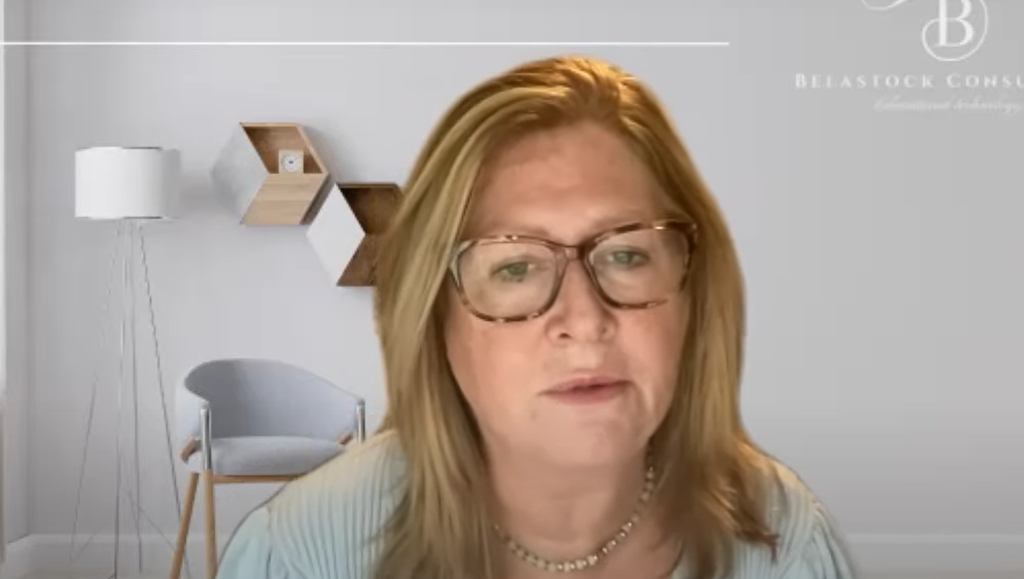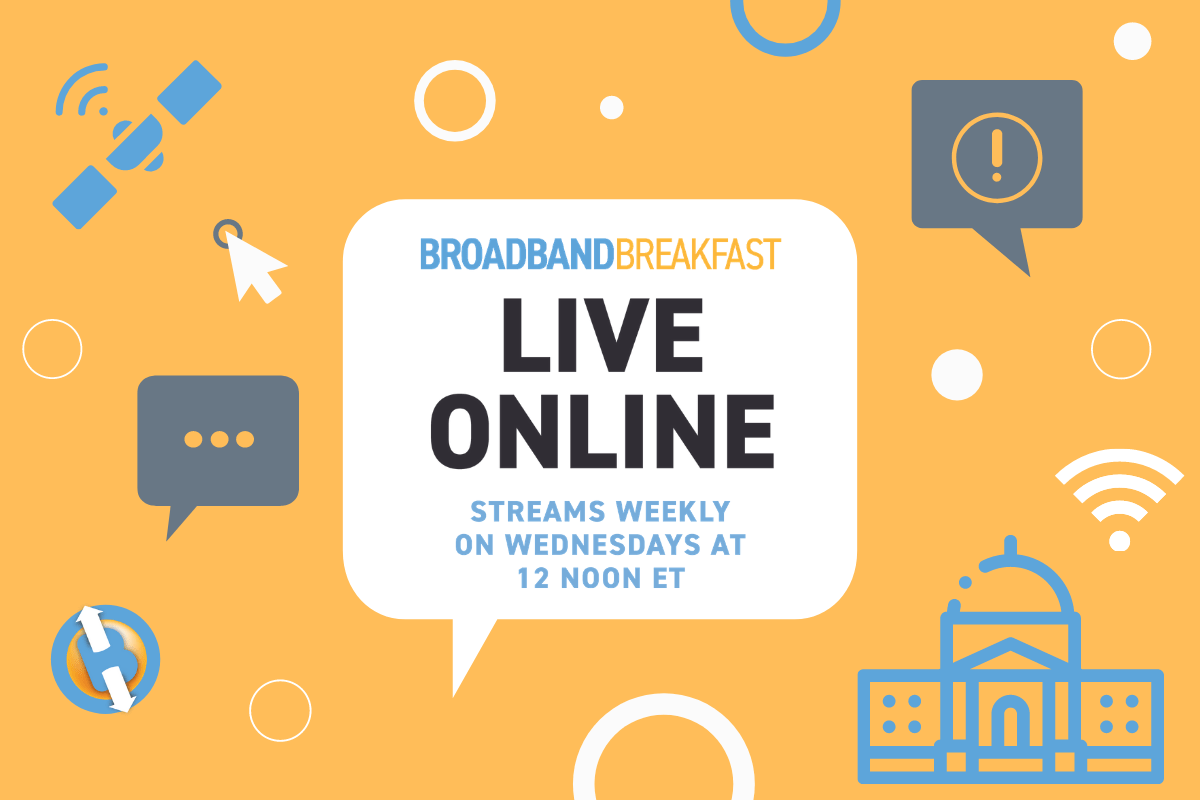Students Should Limit Screen Time, Panel Hears
Experts suggest a combination of active activities and group projects.
Teralyn Whipple

WASHINGTON, August 17, 2023 – Students in K-12 and higher education should have a limited amount of screen time while enrolled in online courses, said digital education experts at a Broadband Breakfast Live Online event Wednesday.
Eileen Belastock, CEO of online education consulting firm Belastock Consulting, said that students do not learn well when they are looking at a screen. Children need more time off screen with tech free options to work on school projects, she said.
“Screen time is not good for students,” she said. “It lends itself to bullying, inappropriate conduct. I also think students don’t learn well when they’re looking at a screen. I think they need more personalized, off screen, tech-free projects to work on.”

Belastock suggested that educators have students conduct online research and engage in real life projects that will switch up their day and help them accomplish something new.
Jason Amos, director of communications at the National School Boards Association, added that educators can add variety into classrooms by assigning passive, active, individual, and group activities. “Sitting on a laptop for hours and hours and hours or sitting in a lecture for that long is not a great way for kids to learn,” he said. He said active group participation remotely can help engage students and provide “tremendous opportunity” for a greater educational impact on the students.
Amos added that it is a concern for how much time children are spending online and not interacting with their peers, especially because students are inclined to relax by playing video games or watching television.
While Charles Severance, clinical professor of information at University of Michigan School of Information, agreed, he added that technology can be more versatile for students enrolled in online courses. Educating technology can be with students while they are outside or on a walk, he said. He urged for educators to find new systems that cater to student’s needs.
Severance added that the biggest mistake in the country-wide push to move all classes in person is that it overlooks that some classes may be preferable online. Some classes do not need close interaction for students to be engaged in learning while others do, he said.
Experts said in March that digital learning is here to stay following the COVID-19 pandemic, claiming that it “opened a door that can’t be closed again” in terms of technology’s role in education.
Our Broadband Breakfast Live Online events take place on Wednesday at 12 Noon ET. Watch the event on Broadband Breakfast, or REGISTER HERE to join the conversation.

Wednesday, August 16, 2023 – Remote Education and Online Learning
The COVID-19 pandemic has turned our world upside down, but it also ushered in a transformative era of education, wherein online learning has emerged as a powerful alternative avenue for academic development. The remarkable progress in virtual reality, metaverse, and artificial intelligence has been steadily dismantling traditional barriers to remote education, such as accessibility, efficiency, and engagement. Where does online learning go from here? How does technology factor into this field? Are there any pitfalls students, educators, and parents should be cautious of, particularly concerning online risks for children?
Panelists
- Jason Amos, Director of Communications, National School Boards Association
- Eileen Belastock, CEO of Belastock Consulting
- Dr. Charles Severance, Clinical Professor of Information, University of Michigan School of Information
- Erik Langner, CEO, Information Equity Initiative
- Drew Clark (moderator), Editor and Publisher, Broadband Breakfast

Jason Amos has more than two decades of experience in education policy and communications, including several years as a congressional staffer. Currently, he is the Director of Communications for the National School Boards Association, a non-profit organization representing state associations of school boards and member school districts. NSBA’s purpose is to ensure that each student everywhere has access to excellent and equitable public education governed by high-performing school board leaders and supported by the community.
Eileen Belastock is the CEO of Belastock Consulting and an EdTech Leadership Specialist with the Mass. Office of EdTech. As a former K12 CTO, she has championed safety and security, encouraged student agency, and supported students with equitable access to their education. She is also a published writer, a national keynote presenter, and the 2020 top 100 Ed-Tech Influencer and 2022 Edtech Digest Leadership Award finalist.
Erik Langner is the CEO of Information Equity Initiative (IEI), an international nonprofit organization committed to ensuring everyone, regardless of geography or income, has access to high-quality, digital learning resources. IEI partners with government agencies, broadcasters, content producers, and funders to provide curated digital content to homes and facilities that lack broadband via a technology called “Datacasting.”
Langner has worked in public broadcasting for two decades and was previously a corporate attorney in New York City and San Francisco, and worked at the United Nations in Geneva. Langner received his law degree from Northwestern University and his undergraduate degree from the University of North Carolina at Chapel Hill.
Dr. Charles Severance is a Clinical Professor and teaches in the School of Information at the University of Michigan. He teaches over popular Massively Open Online Courses (MOOCs) including Python for Everybody – the most popular online programming course in the world on the Coursera, edX, and FutureLearn platforms. He is also a long-time advocate of open source educational technology and open educational resources to empower teachers. Previously he was the Executive Director of the Sakai Foundation and the Chief Architect of the Sakai Project. Dr. Severance has written several books including “Using the Google App Engine”, “Python for Informatics”, “High Performance Computing”, and “Sakai: Free as in Freedom.”
Drew Clark is CEO of Breakfast Media LLC. He has led the Broadband Breakfast community since 2008. An early proponent of better broadband, better lives, he initially founded the Broadband Census crowdsourcing campaign for broadband data. As Editor and Publisher, Clark presides over the leading media company advocating for higher-capacity internet everywhere through topical, timely and intelligent coverage. Clark also served as head of the Partnership for a Connected Illinois, a state broadband initiative.

WATCH HERE, or on YouTube, Twitter and Facebook.

As with all Broadband Breakfast Live Online events, the FREE webcasts will take place at 12 Noon ET on Wednesday.
SUBSCRIBE to the Broadband Breakfast YouTube channel. That way, you will be notified when events go live. Watch on YouTube, Twitter and Facebook.
See a complete list of upcoming and past Broadband Breakfast Live Online events.








